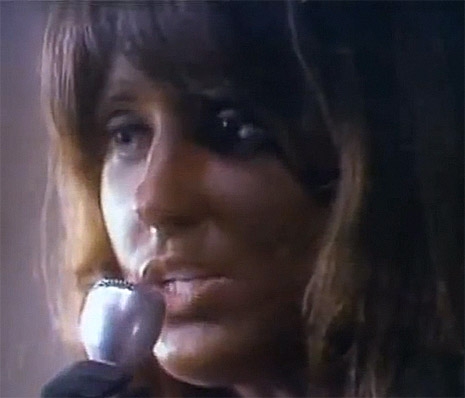
The values dissonance all over this is staggering: in 1968, the Jefferson Airplane appeared on The Smothers Brothers Comedy Hour to sing the title song from their then-new album Crown of Creation. For this appearance, the band’s almost totally uninhibited singer/provocateur Grace Slick sang in blackface and ended the performance with a black power salute.


Slick maintained that the gesture was one of solidarity with either the Black Power Movement generally or Angela Davis specifically (online sources differ, and the difference is sufficiently moot that I don’t care to spend all day Encyclopedia Browning so fine a point), but I can’t imagine how anyone could think that the intent of solidarity could possibly trump the massively offensive history of minstrelsy ineradicably attached to blackface performance. But it could have been just a blip if Slick hadn’t doubled down, appearing on the January 1969 cover of Teenset magazine in blackface. Giving a black power salute. (Irony abounds in that mag: other articles in the same issue include “Jimi Hendrix, Black Power, and Money,” and an editorial by Pat Paulsen about censorship on The Smothers Brothers’ Comedy Hour.) In an article titled “Grace Slick is an Attention-Getting Device,” Slick claimed to have had “about forty different reasons” for the stunt, but specified six of them. Hold on to your hats, people:
1. “If you listen to the words of ‘Crown of Creation,’ think about a spade singing it. It makes a lot of sense.”
2. “Women wear makeup all the time, so why not black? Next time maybe I’ll wear green. Makeup is pretty silly anyway…”
3. “I did it because it was a trip; it’s weird to have blue eyes and a black face.”
4. “The whole thing started when I was watching TV and someone said that blacks look better on television in closeups, so I wandered around the house wearing blackface and flashing on myself in the mirror. Perhaps a bored socialite can do the same thing and go shopping in blackface and maybe pick up some bargains.”
5. “There weren’t any blacks on the show and the quota needed a little readjustment.”
6. “I knew nearly everybody would object to it.”
I get that this, like the original stunt, was a youthful acid-head’s deliberate exercise in provocative audacity. And I’m not posting about this to harp on someone’s decades-old misstep, but because the implications and associations all over this are fascinating to me. But I can’t shake that not-even-a-thing drop of a racial slur in the very first list item. But then I consider the appalling R. Crumb character “Angelfood McSpade,” and I wonder just how prevalent WAS such casual racism in the ‘60s counterculture? Or was “spade” somehow considered OK then? In the wake of the Civil Rights Movement? I can’t even imagine, but then, I wasn’t born until 1970 and was never a hippie, so what do I know? If we’re to believe this was an expression of solidarity—and apart from what seems today like shocking tone-deafness, there’s little reason to believe it wasn’t one, the Jefferson Airplane’s radicalism wasn’t posturing—then the slur would seem way out of bounds. Like I said right up front, values dissonance all over this. But after that issue of Teenset, perhaps realizing she wasn’t doing anyone any favors, Slick seems to have let the blackface stunt drop and went back to being more productively badass. Until Jefferson Starship…
“Lather” in blackface from the same show:
Previously on Dangerous Minds
Higher revolutionary mutation with the Jefferson Airplane, 1970
Grace Slick’s two regrets: never screwed Hendrix, never rode a horse
Psychedelic ‘Sesame Street’: Grace Slick’s free-jazz counting songs & ‘The Tomato’